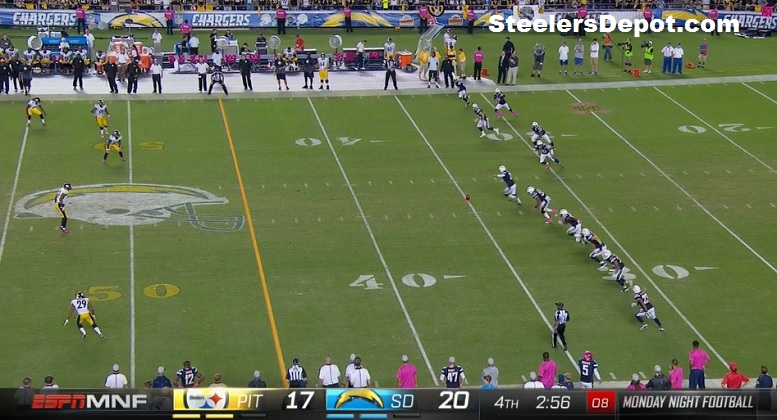As we reported late Monday night, the Pittsburgh Steelers were shorted 18 seconds of clock time during the San Diego Chargers final kickoff of the contest and on Tuesday, the NFL released the following statement that addressed the error.
With 2:56 remaining in the fourth quarter, San Diego kicked off to Pittsburgh. The kick resulted in a touchback. By rule, the game clock does not start if the receiving team possesses the ball in the end zone and does not carry it into the field of play.
Because of an error by the clock operator, the game clock was incorrectly started before the Steelers’ first play from scrimmage following the touchback. That first down snap came with 2:38 left to play instead of 2:56, a difference of 18 seconds.
The official game time is kept on the stadium scoreboard, but it is the responsibility of the side judge to supervise the timing of the game. Had the side judge or any of the other six on-field officials noticed the timing error, they could have corrected it.
The game clock is not subject to instant replay review unless there is a timing issue on the last play of the first half or the last play of the game.
The performance of the clock operator and game officials will be reviewed per the standard procedure for reviewing every play of every game.
After Monday night’s game, Steelers head coach Mike Tomlin said that he wasn’t aware of the clock error. On Tuesday, he was again asked to address the clock situation and specifically if anyone on his staff is assigned to keep tabs on things such as that.
“We got a lot of things going on just terms of managing our responsibilities,” said Tomlin. “We proceed with the assumption that the clock is going to be managed properly. And I’m not going to comment too much on that. I know that the league is going to have a statement regarding that, or at least I assume they’re going to have a statement regarding that. It didn’t define the outcome of the game, so I’m moving on with my work week.”
Tomlin was then asked if the team will make plans to make sure that nothing like that ever happens again in the future without them being aware of it.
“We’re not going to run around chasing ghosts and working at doing other people’s jobs,” said Tomlin. “There’s a myriad of jobs that go on in a stadium to make a game go and we’re going to assume that people are going to be competent and do their job. I’m not going to check to make sure that concessions need help in concessions. I’m not going to check that the clock guy’s managing the clock. Those are their jobs. Our job is to focus on the management of our plan and our people and play and win the game. So that’s where I’m going to keep my focus.”
Ok, I’ll say it. Tomlin’s answer is not the right one. The team should hire or assign someone to keep the clock operator honest. It’s the right thing to do. Sure, the Steelers won the game, but imagine if running back Le’Veon Bell had been stopped short of the goal-line on the final play of the game. The Tuesday narrative would include the Steelers being shorted 18 seconds of clock time on that kickoff.
Just because things played out in the favor of the Steelers doesn’t mean that the organization should turn a blind eye to what happened with the clock Monday night. Humans make errors, Computers make errors. Somebody needs to be charge of making sure they catch those errors. It’s really that simple. Tomlin and the Steelers should assume nothing when it comes to important elements of a game such as that.








